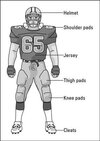Coaching panels coach players to pin the arms to disable disposal by the tackled player.
The issue though is if the tackled player is brought to ground there is risk of head contact with the ground, and by extension possible concussion. Seems now if you bring a player to ground with their arms pinned it's an automatic suspension, regardless if the tackle is a slinging motion or not.
IMO, the action should be judged and not the outcome, i:e if the tackled player is not deliberately slung in the tackle yet still hits head on the deck then it should be either ball up or free kick for htb. This of course assumes the prior opportunity rule is in play.
After all this is a full contact sport and players should and probably would know the dangers of participating in such a game, and should probably be signing a waiver.
Nathan Buckley has suggested we remove the prior opportunity rule (with support from other commentators) to encourage the umpires to blow the whistle before a player is brought to ground, i:e penalize the player with ball that do not dispose of the ball in a tackle. This obviously brings its own issues, i:e players will be discouraged to win the ball in congestion.
So if that is not the answer, how do we tackle the tackling issue?
Do we ban tackling altogether? Well then we may as well just make it touch footy, would instantly kill the game.
Do we ban pinning the arms? Well then that will enable the tackled player disposal, that goes against the idea of disabling the tackled player possession. Even if it were plausible, and given the speed of the game, trying to coach players to tackle without tackling the arms, well, yeah good luck with that.
I think we should go back to basics, if the tackled player is immediately tackled and has no option to dispose of the ball, then the umpire immediately comes in for a ball up, or, if the player has prior and is dispossessed or incorrectly disposes of the ball it's a free kick. Too often the ball is locked up after too much time before the whistle is blown.
Obviously this is easier said than umpired, would be extremely difficult for the umps to adjudicate correctly given the speed of the game.
So how do we tackle the tackling issue?
The issue though is if the tackled player is brought to ground there is risk of head contact with the ground, and by extension possible concussion. Seems now if you bring a player to ground with their arms pinned it's an automatic suspension, regardless if the tackle is a slinging motion or not.
IMO, the action should be judged and not the outcome, i:e if the tackled player is not deliberately slung in the tackle yet still hits head on the deck then it should be either ball up or free kick for htb. This of course assumes the prior opportunity rule is in play.
After all this is a full contact sport and players should and probably would know the dangers of participating in such a game, and should probably be signing a waiver.
Nathan Buckley has suggested we remove the prior opportunity rule (with support from other commentators) to encourage the umpires to blow the whistle before a player is brought to ground, i:e penalize the player with ball that do not dispose of the ball in a tackle. This obviously brings its own issues, i:e players will be discouraged to win the ball in congestion.
So if that is not the answer, how do we tackle the tackling issue?
Do we ban tackling altogether? Well then we may as well just make it touch footy, would instantly kill the game.
Do we ban pinning the arms? Well then that will enable the tackled player disposal, that goes against the idea of disabling the tackled player possession. Even if it were plausible, and given the speed of the game, trying to coach players to tackle without tackling the arms, well, yeah good luck with that.
I think we should go back to basics, if the tackled player is immediately tackled and has no option to dispose of the ball, then the umpire immediately comes in for a ball up, or, if the player has prior and is dispossessed or incorrectly disposes of the ball it's a free kick. Too often the ball is locked up after too much time before the whistle is blown.
Obviously this is easier said than umpired, would be extremely difficult for the umps to adjudicate correctly given the speed of the game.
So how do we tackle the tackling issue?





